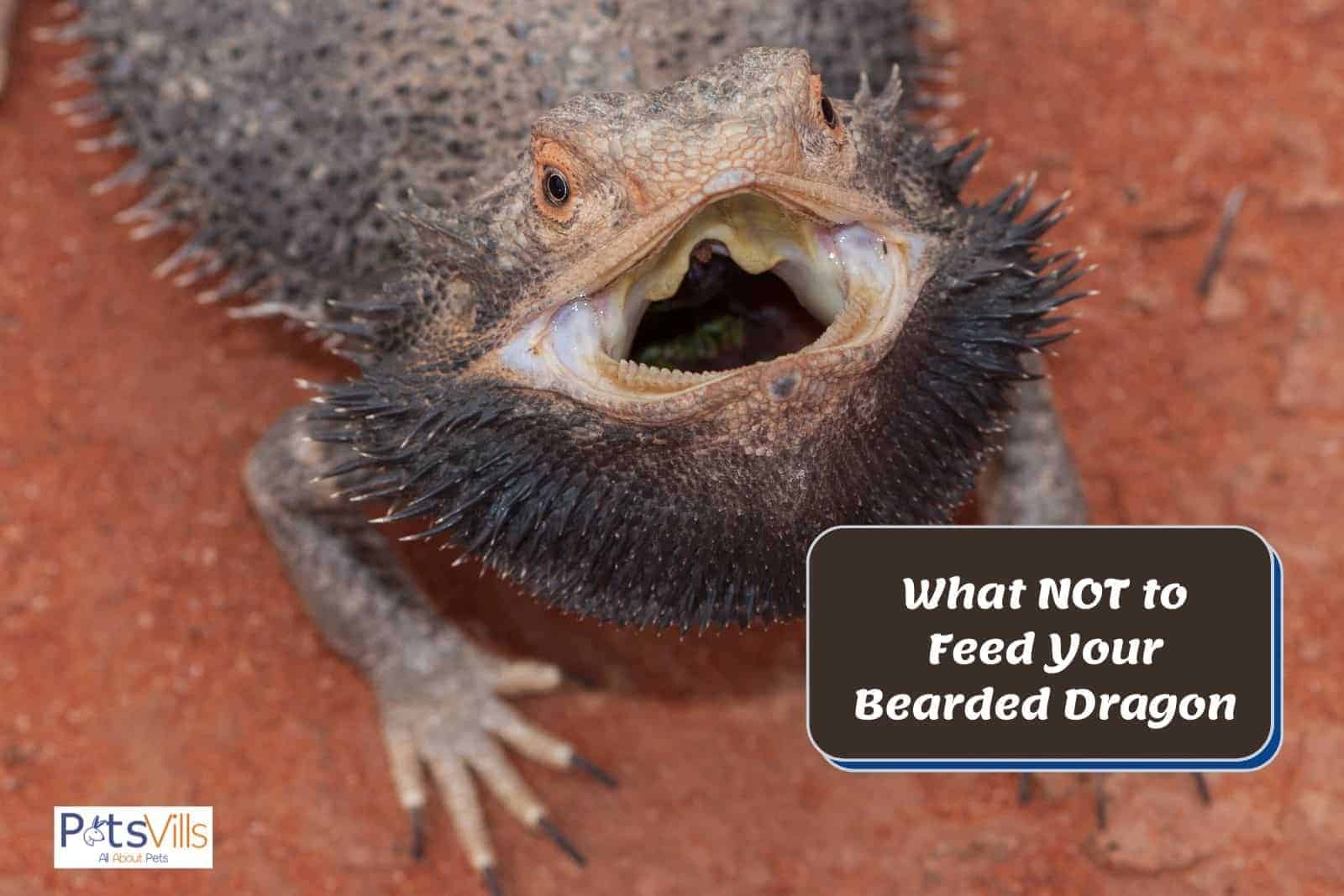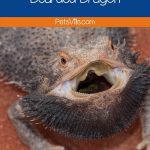If you’re looking for information on what NOT to feed your bearded dragon, we’ve got you covered!
Below, we’re sharing an EXCLUSIVE sneak peek at the toxic food list in our new Bearded Dragon Feeding Guide book!
Topics such as where to buy bearded dragon food, recipe list, and many more are found within it!
Let’s jump right in, shall we?
WHAT NOT TO FEED YOUR BEARDED DRAGON [EXCLUSIVE EXCERPT]
We’ve already discussed in detail what bearded dragons can eat but let’s look at things that can be harmful to them.
No matter how diverse their “can eat list” is, there are certain food items that you just can’t feed your dragons.
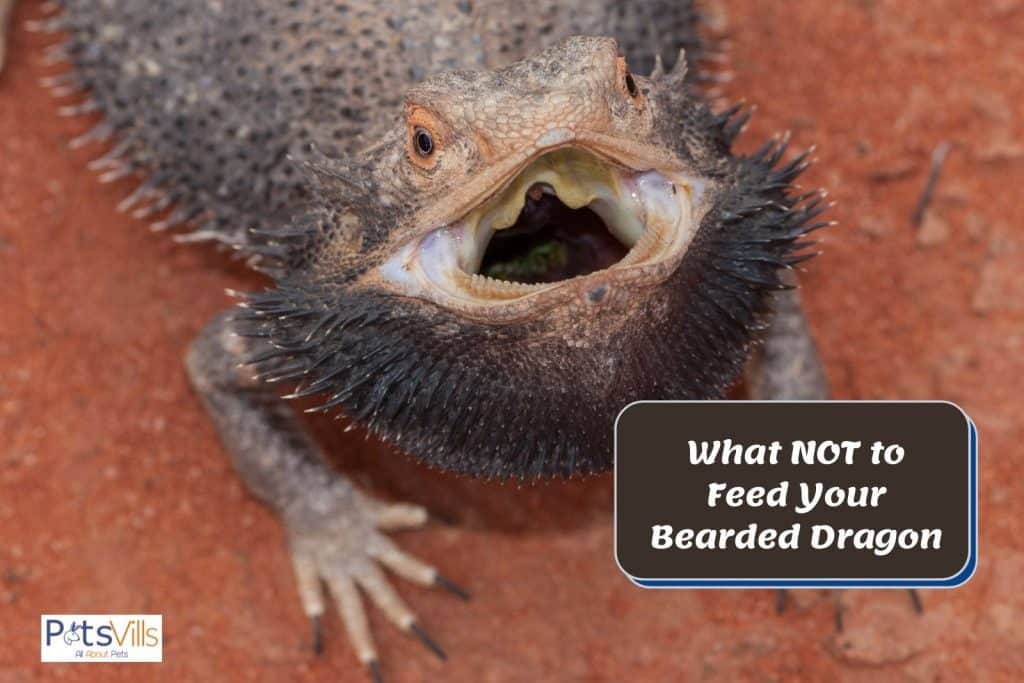
It’s great that you provide them with a plethora of options– a bearded dragon diet guide, but do you know which fruit, vegetable, or insect are bad for your bearded dragon?
Bearded Dragons are inquisitive eaters and will eat almost anything they find interesting.
However, there’s a huge difference between what they find interesting and what’s actually safe.
Given the opportunity, your beardie will gobble down avocados or fireflies.
So, your first and foremost responsibility as an owner is to research what food can be harmful to your pet.
Lots of foods can be bad. Some are harmful, some are toxic and downright poisonous, some hard to digest while some delicacies are wrong for a certain age group. But can bearded dragons eat sweet potato though?
Let’s dive right in and find out which is which.
The RED Zone
You should never feed these food items to your bearded dragons ever. They are extremely harmful to them.
Insects to Avoid
- Fireflies and Glowworms
Fireflies are notorious because they are highly toxic not only to bearded dragons but to other reptiles as well.
They may look pretty twinkling about but can kill beardies.
If you take your bearded dragon outside in the garden always keep an eye out for these pesky bugs and always keep a charcoal capsule/powder at hand.
It’s said that their glow is from toxic chemicals so that’s a big no.
- Ladybugs
No matter how much your bearded dragon loves the red color, ladybugs are one thing red you should never feed it.
And no matter how adorable you find them, keep your bearded dragon away from them! They are plainly poisonous.
- Poisonous/ venomous Bugs (scorpions, spiders)
They are considered deadly for a reason and not only for humans. These insects can bite your bearded dragon either internally or externally.
If some accident does happen immediately visit your vet. These insects are venomous and can cause significant pain, ofttimes death in bearded dragon’s case.
- Dead insects
Think of it yourself why did the bug die in the first place? It may have been sick or had a parasite.
Dead bugs have a low nutritional value as their moisture content falls rapidly. They also act as a magnet for bacteria and other pests that can harm your dragon if eaten.
Fruits and Greens to Avoid
- Avocado
Avocados have a high amount of oxalic acid which is fatal for bearded dragons if taken in large quantities.
A small portion of avocados can make your beardie sick whereas large amounts can lead to death.
Avocadoes are considered extremely toxic for reptiles and deadly for birds. They may be a powerhouse for humans, not so much for bearded dragons.
Steer clear from these! And if your dragon eats avocado by accident consult the vet and detoxify him with charcoal powder immediately!
- Bran, wheat
These food items are extremely high in phosphorus and fiber.
- Rhubarb
Like avocados, rhubarbs are also considered toxic for bearded dragons because they are high in oxalic acids. Never feed them to your pet.
- Fruits/flowers covered in chemicals.
Doubtful fruits and flowers obtained from doubtful places such as florists or gardens should never be fed to bearded dragons because they are usually sprayed with insecticides and pesticides.
These chemicals are extremely harmful to not only bearded dragons but humans as well.
- Certain Mushrooms
Certain types of mushrooms are poisonous and toxic for animals. If you let your beardie outside in the garden always keep an eye out for mushrooms.
If you find one or two growing, look up the internet and search if they are toxic or not. And if the beardie does eat one call the vet ASAP!
- Dairy Products
Never feed your dragon dairy products because they don’t have the enzymes required to break them down.
- Acidic Fruits
Acidic fruits like lemon, oranges, limes, tangerines, and pineapples should never be served. Even rarely!
The high acidity content can seriously destroy the balance of acid levels in their stomach and digestive tract.
This, in turn, can result in digestive problems like runny stools! Which can be messy to clean up. So be warned!
READ MORE: Can Bearded Dragons Eat Cheese?
Check out this video about what not to feed your bearded dragon.
Yellow Zone
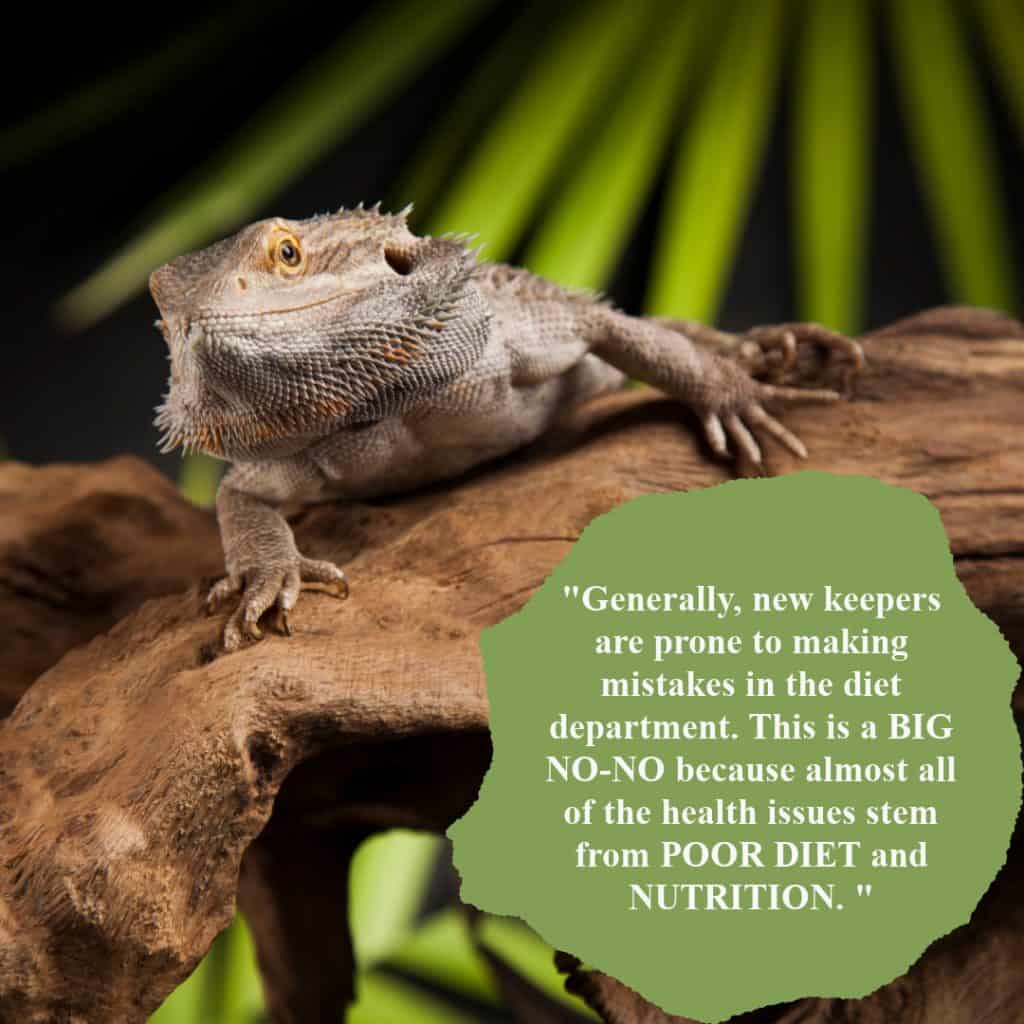
These food items are still being tested and are considered questionable. definitive scientific studies say otherwise, refrain from feeding these to your bearded dragon.
- Beef (ground low fat)
Beef is high in phosphorus and proteins. These high quantities can make your beardie sick. Serve them other options for meat like crickets, roaches, and worms.
- Bread (white)
Bread is great for hiding meds in. Only use them when you need to give your bearded dragon his medicine. Otherwise don’t feed them bread.
- Chives
Chives are high in vitamin C, high in oxalates, and high in vitamin A. This much dosage can be fatal for bearded dragons. Don’t feed bearded dragons chives. Period.
- Eggplant (raw)
Eggplants are too acidic for your bearded dragon. Raw or cooked, eggplants should be kept away. It’s better to be safe than sorry!
- Garlic
Garlic belongs to the same genus as onions and chives. So, they are not good and can make your bearded dragon sick.
- Iceberg Lettuce
Iceberg lettuce has little to no nutritional value. It’s basically feeding water to your bearded dragon. It is known to cause digestive problems like diarrhea in beardies.
You should avoid feeding your dragon unless it’s an absolute emergency. No matter how delicious it is for bearded dragons, simply refrain.
Better options are dandelion leaves, kale, and watercress.
- Onion
Onions are too acidic for beardies. Don’t go around feeding them onions!
- Bees and wasps
A lot of people freak out when they see their beardie eat a bee or a wasp. A bearded dragon can eat bees and wasps but it’s best to avoid them.
- Insects captured from the wild
As mentioned above insects captured in the wild can be carriers of parasites or insecticides. They aren’t critically dangerous but you can never be too cautious.
Most of the time beardies are perfectly fine after eating one or several. After all, that is how they survive in the wild!
READ MORE: Can Bearded Dragons Eat Eggs?
Feed-Rarely-Zone
While not toxic, bearded dragon owners suggest that you rarely feed these fruits and vegetables to your pet.
How much to feed bearded dragon will solely depend on your better judgement
- Beets Greens
Beets are high in magnesium and vitamin A. However they contain chemicals that hinder the absorption of calcium which can result in Metabolic bone disease.
Feed beet tops rarely to your bearded dragon if you have to. Otherwise, we’ll suggest steering clear from them!
- Yellow Corn
Yellow corn is packed with phosphorus and a moderate amount of oxalates.
You can feed them to your bearded dragon but other veggies and greens that are more healthy can provide the same nutrients. Stick with those!
- Parsley
Parsley is jampacked with high amounts of oxalates, vitamin A and Vitamin C. There are other great options that you can feed your beardie. Occasional parsley, however, hurt no one!
- Raspberries
It is ok to feed your bearded dragon raspberries once a month. But just that because they contain moderate amounts of oxalates.
Check this video for a quick recap:
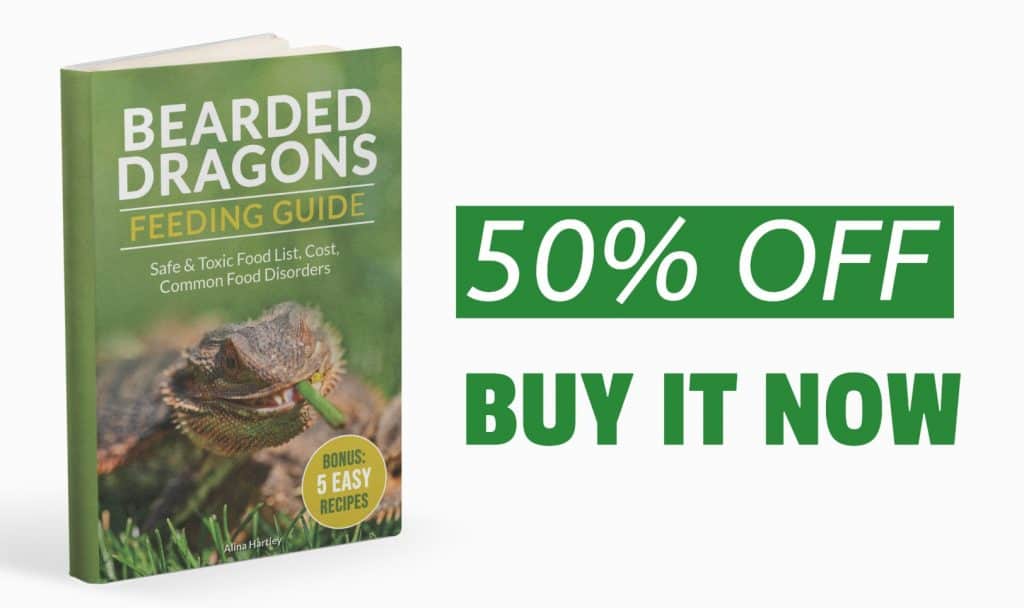
Do you have any questions about what NOT to feed your bearded dragon? Share below!
Alina Hartley is a small-town girl with a ginormous love of bearded dragons. It all started with Winchester, a baby bearded who was abandoned at the shelter by his former owners because of a birth defect that caused one front leg to be shorter than the other. Alina originally went to the shelter looking for a guinea pig, but one look at Winchester and it was love at first sight. From that day on, Alina has dedicated her life to learning everything she can about bearded dragons. She loves helping new beardie parents start their incredible journey with these magnificent reptiles.
Follow her on:
LINKEDIN
TWITTER.
Read her latest articles HERE
Learn more about her HERE.

